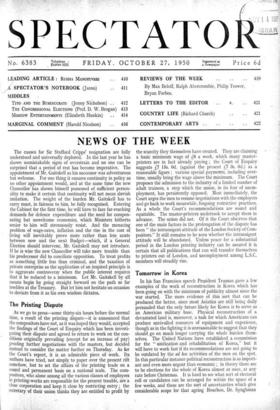The Printing Dispute
As we go to press—some thirty-six hours before the normal time, a result of the printing dispute—it is announced that the compositors have not, as it was hoped they would, accepted the findings of the Court of Enquiry which has been investi- gating their dispute and agreed to return to work on the con- ditions originally prevailing (except for an increase of pay) pending further negotiations with the masters, but decided instead to consider the matter further on Thursday. As for the Court's report, it is an admirable piece of work. Its authors have tried, not simply to paper over the present rift somehow, but to set the affairs of the printing trade on a sound and permanent basis on a national scale. The com- positors, who alone among all the various classes of employees in printing-works are responsible for the present trouble, are a close corporation and keep it close by restricting entry ; the secretary of their union thinks they are entitled to profit by the scarcity they themselves have created. They are claiming a basic minimum wage of £8 a week, which many master- printers are in fact already paying ; the Court of Enquiry suggests £7 15s. Od. (against the present £7 3s. 6d.) as a reasonable figure ; various special payments, including over- time, usually bring the wage above the minimum. The Court proposes the admission to the industry of a limited number of adult trainees, a step which the union, in its fear of unem- ployment, has persistently opposed. Most immediately, the Court urges the men to resume negotiations with the employers and go back to work meanwhile, forgoing restrictive practices. As a whole the Court's recommendations are sound and equitable. The master-printers undertook to accept them in advance. The union did not. Of it the Court observes that one of the main factors in the prolongation of the dispute has been " the intransigent attitude of the London Society of Com- positors." It still remains to be seen whether the intransigent attitude will be abandoned. Unless peace for a substantial period in the London printing industry can be assured it is certain that all publications that can will transfer themselves to printers out of London, and unemployment among L.S.C. members will steadily rise.


















